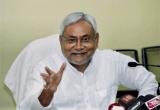
Kumar has personal fortune comprising cash, deposits in banks and movable/immovable properties worth Rs 68 lakh in contrast to his son's properties worth about Rs 1.99 crore comprising deposits in banks and investment to the tune of Rs 81.68 lakh and immovable properties over Rs 1.15 crore.
Both the Chief Minister and his son have shown no financial liabilities.
Interestingly, Kumar has only Rs 17,090 cash in hand, while his son has even less cash with him at Rs 7095 only.
The Chief Minister had declared income of Rs 1,41, 412 for self in the financial year 2012-13 as against his son's income at Rs 4,02,250.
Kumar's son has overtaken him by a wide margin in terms of accumulation of movable assets comprising deposits, investment and durables worth Rs 81.68 lakh against Rs 6.88 lakh, according to the declaration made by the Chief Minister.
In terms of accumulation of immovable assets like land and other properties, the Chief Minister's son has such assets worth Rs 1.17 crore as against Kumar's Rs. 53.38 lakh.
Compared to declaration by the Chief Minister in 2011 and 2012, his financial fortunes have shrunk consistently over the past two years, while that of his son has grown manifold during the same time span.
The Chief Minister had made it mandatory for himself and his ministers to declare their assets annually by December 31 every year since 2010 after romping to a landslide victory for a second successive term.
All JD(U) ministers too have declared their assets and properties for the year 2013.





Comments
Add new comment